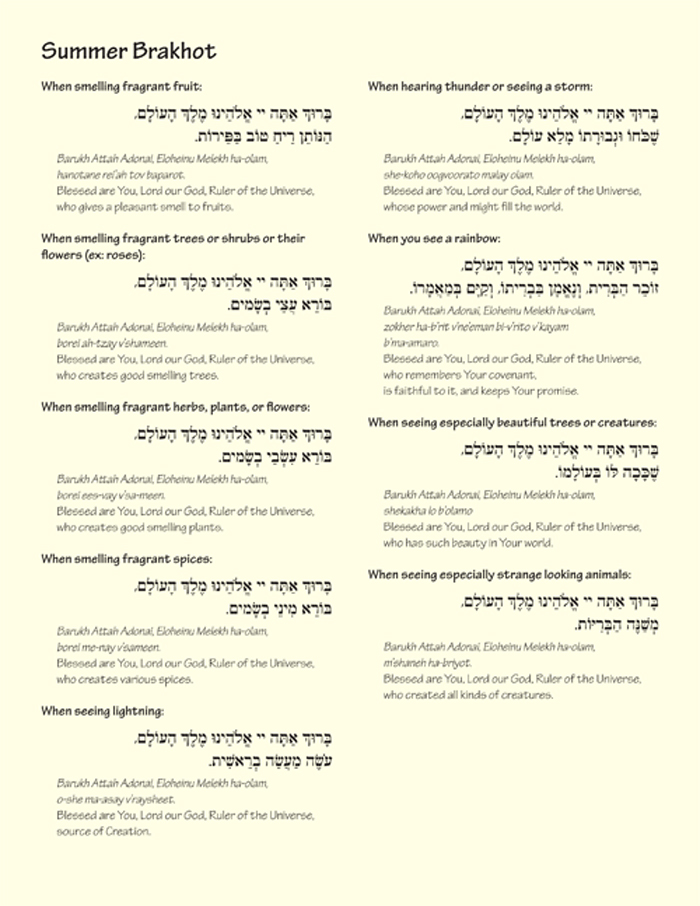Dale Cooperman and Idie Benjamin
 In some Jewish Early Childhood Programs, summer program can be a vacation from the Jewish focus that guides the school year. Of course, there is Shabbat to celebrate every Friday, but without a holiday to learn about and then celebrate, our programs can seem no different than any other center based summer program.
In some Jewish Early Childhood Programs, summer program can be a vacation from the Jewish focus that guides the school year. Of course, there is Shabbat to celebrate every Friday, but without a holiday to learn about and then celebrate, our programs can seem no different than any other center based summer program.
This gets to the heart of two realities we face. The first is that Jewish early childhood education is overwhelmingly focused on holidays. Of course, our traditions and holidays are important in helping to develop young Jewish identities, but they are not all there is to living a Jewish life. The second reality is that we see our programs as having separate Jewish and secular sides and integrating them can be a challenge.
Early childhood education emphasizes teaching the “whole child” and integrating all of the “selves.” One essential “self” is the child’s Jewish identity. Our programs must find ways to bring Jewish ideas and values into the program all of the time. A vibrant Jewish life is enriched by the entire world and our world experiences are enriched by Judaism.
So how do we “root” a summer program in teachable Jewish moments? It is actually a blessing that there is no holiday to distract us. During the summer we can show that a Jewish life is not only celebrating a holiday but a way of interacting with the world every day.
Summer programs are all about being outside and having opportunities to enjoy the natural world. Outdoor Classrooms are sensory laboratories for exploring and learning about God’s amazing world. Outside there is water, sand, dirt, mud, trees, a marvelous variety of animals, people, habitats, and endless opportunities for hands on learning.
Childhood should be all about wonder and “aha” moments. Nature gives us so many moments for awe. Brakhot/blessings give us the words to express our appreciation.
And simply “being” in nature provides opportunities to show appreciation and wonder with a blessing, a brakhah. These remarkable opportunities provide the basis to teach how Jews can respond to the beauty of these experiences.
Are children eating fruit that has a wonderful smell? There is a blessing for that.
Are children finding that some tree, bush, or flower has a beautiful smell? There is a blessing for that.
When children harvest lavender or any other herbs or spices that have been grown or found to make a b’samim/spice holder for Havdalah, enjoy the new smell and say the appropriate blessing.
Depending on where you live, thunder and lightning abound in the summer. It’s not unusual for children to be frightened by these storms. Don’t just assure them that everything is fine. Teach them that Judaism appreciates nature with special words about what is happening and say the blessing for thunder and lightning. Help the children to be comforted by the ritual.
And if the children are fortunate to see a rainbow, remember the story of Noah, and say the blessing for seeing a rainbow.
Is there a field trip to a zoo or a nature preserve? Will animals visit the school? Do the children have a favorite animal, or one that they think is truly beautiful – or unusual? There are blessings to mark when we see these creatures.
Saying a blessing is putting the brakes on the moment. We don’t just gobble down our food; we stop and help the children appreciate what we have by saying thank you. We don’t just smell or look at something, we stop and consider it and express our thanks. When we do this with children, we help them to learn to stop and really see the world around them and be thankful for all of its blessings, even those creatures that are unfamiliar, odd, or just plain strange!
We will bet that as you help the children to stop and take notice of the gifts that summer offers, you will, too. And won’t that be a blessing?
All of these blessings begin the same way and each has its own ending phrase.
We begin each blessing with the same words, acknowledging God’s presence in our lives, and then each has its own, special ending phrase.


